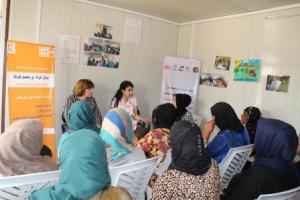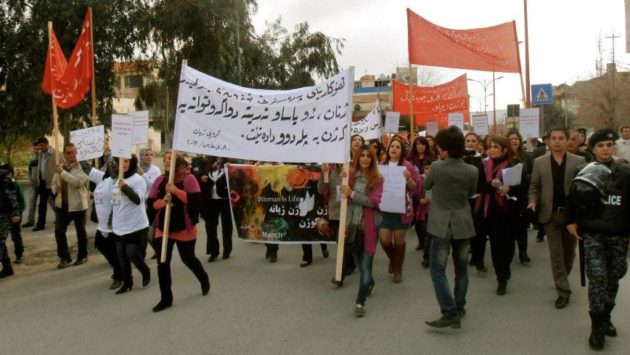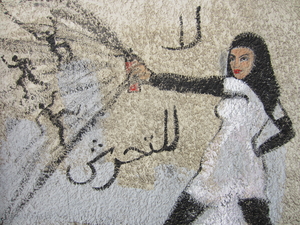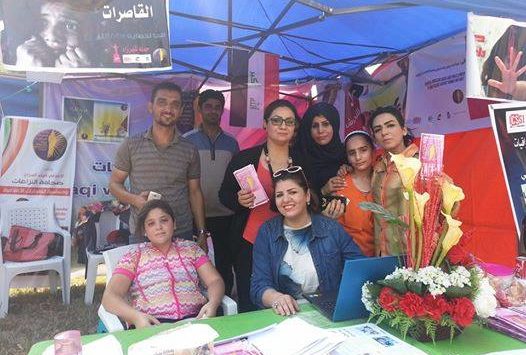No to Harassment, No to Tribal Fusliya! Iraqi Women Want Their Rights and Freedom!
Updates on #Shahrazad Campaign – July 2015
Protecting displaced and refugee women from harassment
A forum on the subject of sexual harassment was conducted at the “Bahrakah” Refugee Camp in Erbil. Twenty displaced women participated in the discussions, which focused on defining the types of harassment that women are experiencing. The women also shared their views concerning how to identify and address the most significant cases of harassment inside the camp.
Laws relating to harassment were explained and the role that the camp administration can take to confront these cases was discussed, especially the duty of the camp administration to listen to complaints of harassment and to provide social and legal assistance. Participants also considered the possibility of cooperating with civil society organizations that are working in the camps on these issues.
The forum was organized by Al-Messalla Organization as part of its work to further the Shahrazad Campaign, which aims to mobilize public opinion against the phenomenon of harassment and underage marriage in Iraq. Al-Messalla is focusing in particular on the provinces in Kurdistan Region.
Dismissal of the Director of the Dormitories at the University of Baghdad following harassment of a student!
Baghdadi civil society was motivated by the experience and actions of a female student from the University of Baghdad to promote an initiative that could put an end to the harassment of university students by the staff in Iraqi universities.
Civil society activists shared across social media news about the Director of Dormitories at the University of Baghdad who harassed one of his students. This student possessed the courage and the will to speak out publically about her case and to condemn those responsible. The Iraqi public became very active in criticizing this particular incident, despite the fact that other cases of harassment have occurred and continue to occur in workplaces, study places and public spaces. What made the difference was the courage of this student and her determination to protect her fellow students from the man who served as Director of the Dormitories at the University of Baghdad.
As a consequence of the activities of civil society and its continuing condemnation of this shameful phenomenon, the Iraqi Ministry of Higher Education decided to dismiss the harasser. Activists in the Shahrazad Campaign celebrated this result and called for further efforts to address the phenomenon of harassment. Long-term solutions should be based on studies of legal and social realities and must encourage the community to condemn the harasser, and not “blame the victim”. It is also important that policies promote the customary and routine coexistence of females and males in the workplace, study places and public spaces. Any policies aiming to separate women or prevent their access to public places must be rejected.
Tribal Fusliya phenomenon rises again
The phenomenon of tribal “Fusliya” has recently begun to be practiced again in parts of Iraqi society. Last May the southern city of Basra witnessed an armed tribal conflict between two clans of the city that caused deaths and injuries among civilians. Following negotiations between the parties to the dispute, they decided to settle the conflict by one tribe’s giving 50 women to the other tribe as compensation.
Tribal Fusliya is an old tradition in Iraqi society. The giving of an amount of money or a woman as compensation for killing or injuring someone of another tribe is still part of the customs and practices of tribal Iraq; it grows stronger whenever the rule of law weakens. As part of the struggle of the Iraqi feminist movement at the end of the 20th century, women and men who advocated for women’s rights opposed the practice of Fusliya. Their great achievement was the passage of the Personal Status Law No. 188 of Iraq, in 1959, which was a great victory representing progress for Iraqi women and the society of Iraq in general. Afterwards, Iraqi society had advanced along a path of applying and recognizing the rule of law; there had been a marked decline in traditional practices, including Fusliya, until quite recently.
Civil society movement against the return of practicing Al-Fusliya
In response to this rise in the practice of Tribal Fusliya during the current difficult political and security situation, and in light of the challenges facing law enforcement in Iraq in general, after the events in Basra, Iraqi civil society organizations organized a seminar, “Fusliya: Women between Law and Tribal Customs”. The seminar, which was hosted by the Iraqi Social Forum in cooperation with its partners, the Union of Engineering Professions, and the Democratic Movement, took place in Al-Qishlah Gardens in Al-Mutanabi Street, in Baghdad, on the morning of Friday, June 12, 2015.
Prominent activists in attendance included, women’s rights advocate, Ms. Hanaa Edwar, and human rights activist, Mr. Mohammed Salami. They discussed with seminar participants the failure to apply Iraqi law, and the growing influence of clan and tribal values over Iraqi society, especially on Iraqi women. Based on everyone’s participation, the seminar concluded with a set of recommendations to address the resurgence of Tribal Fusliya that will be submitted to the government, including legislative and specialized authorities.
Recommendations on Tribal Fusliya:
- Urge the Iraqi Council of Representatives to promote and monitor the enforcement of laws that protect women’s rights.
- Support the sovereignty and authority of law.
- Conduct surveys and research studies to identify how women are affected by tribal customs.
- Encourage civil society organizations and organizations defending women rights in particular, to conduct seminars, workshops, conferences and educational symposia for the heads of tribes and clans, and for dignitaries in Baghdad and the provinces, to promote understanding of the rule of law and to discourage the practice of any tribal customs that lead to the oppression of Iraqi women.
- Urge all educational institutions to assume their vital responsibility for spreading a culture of respect for the rule of law.





